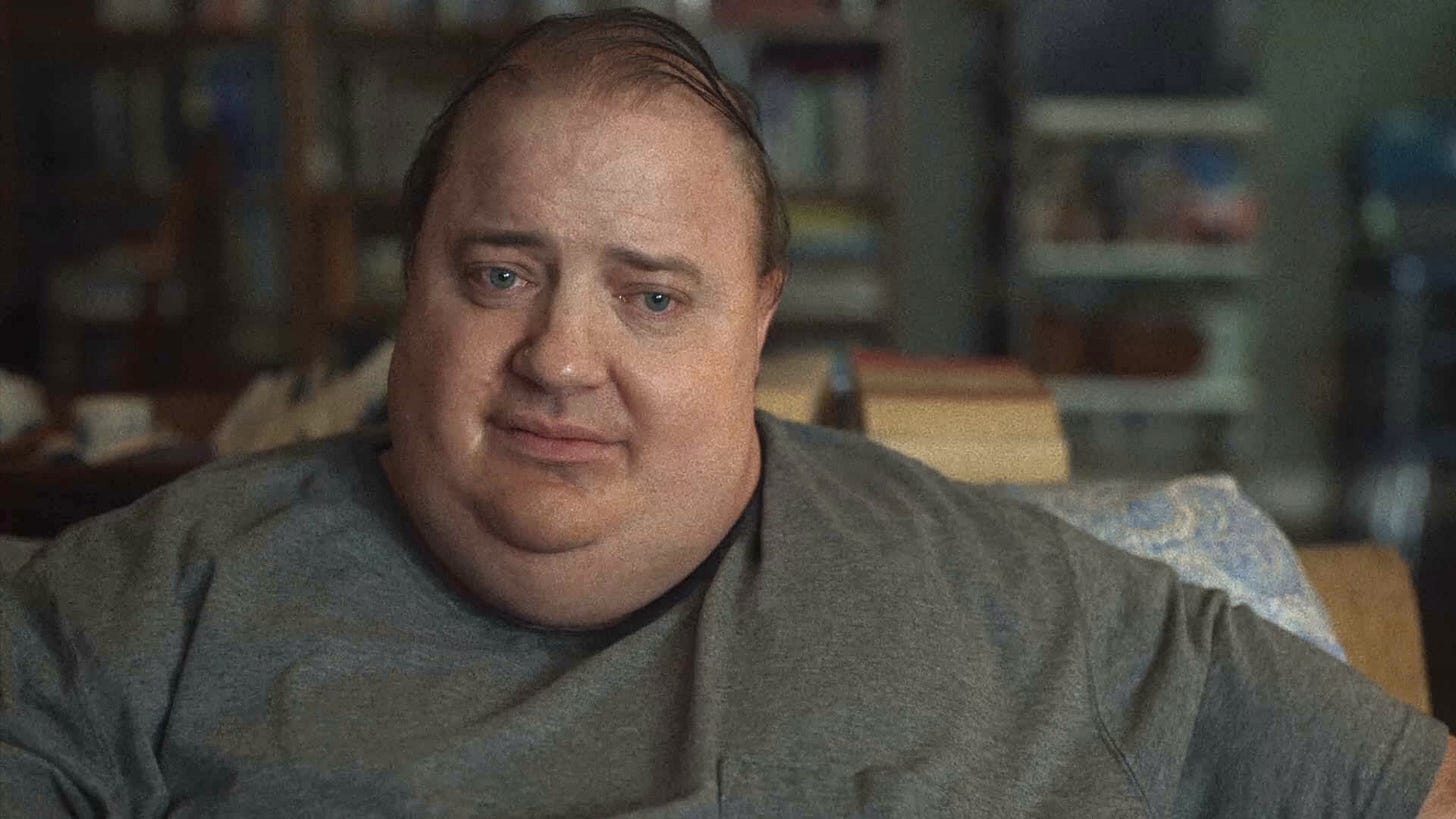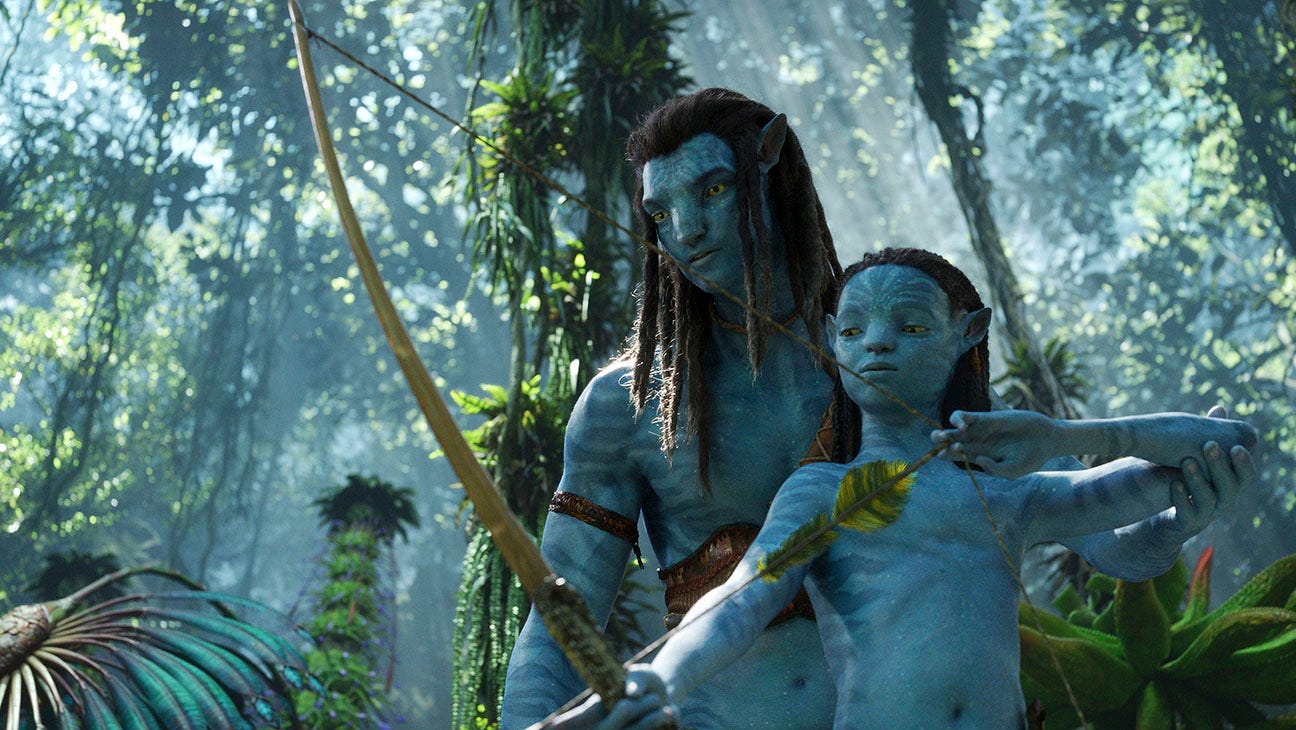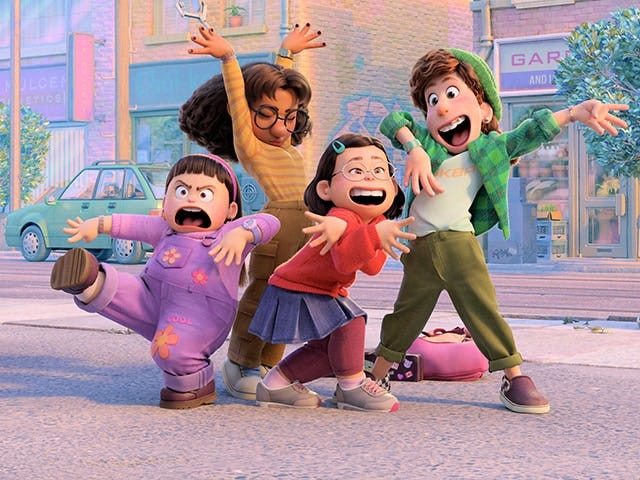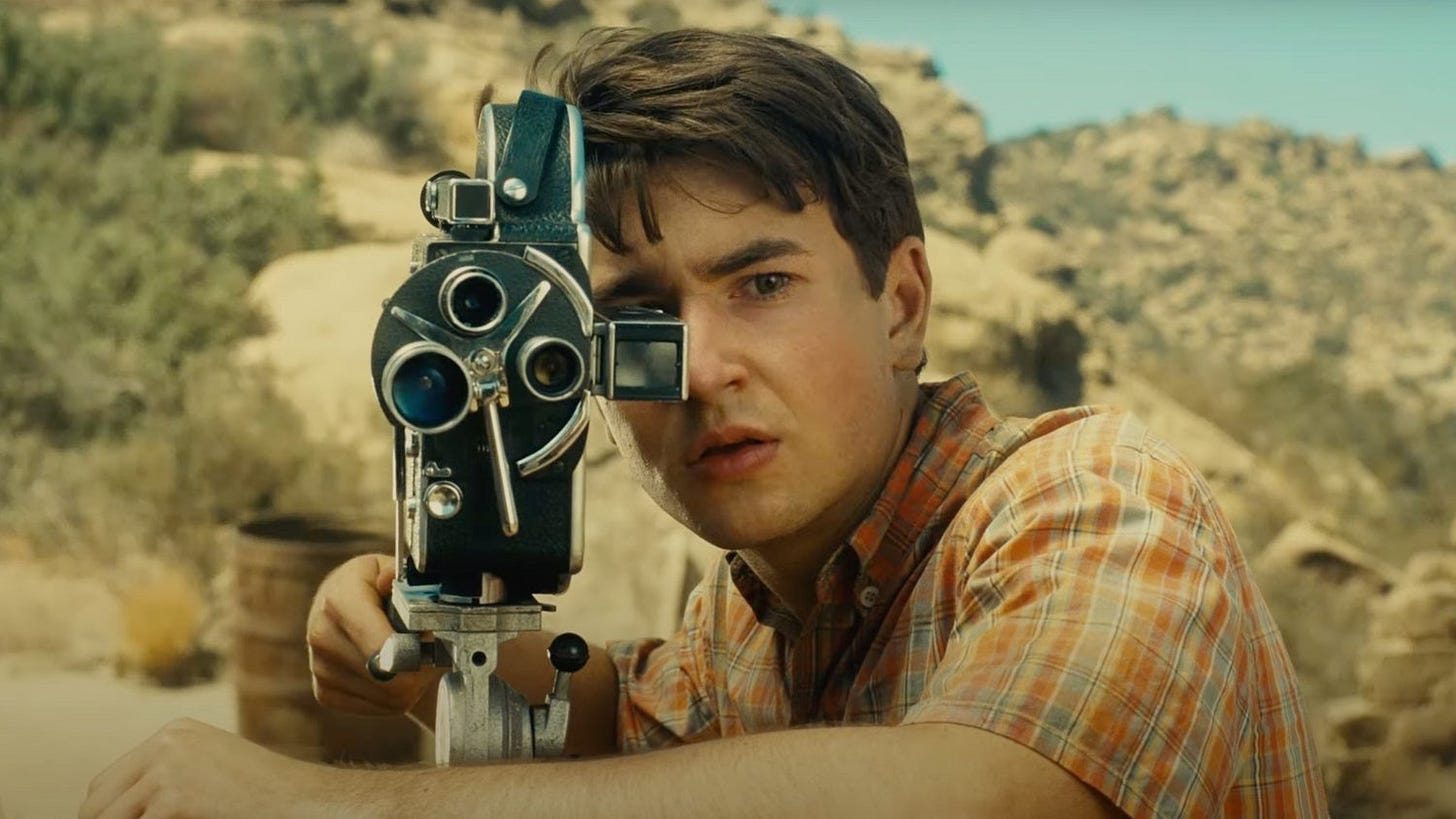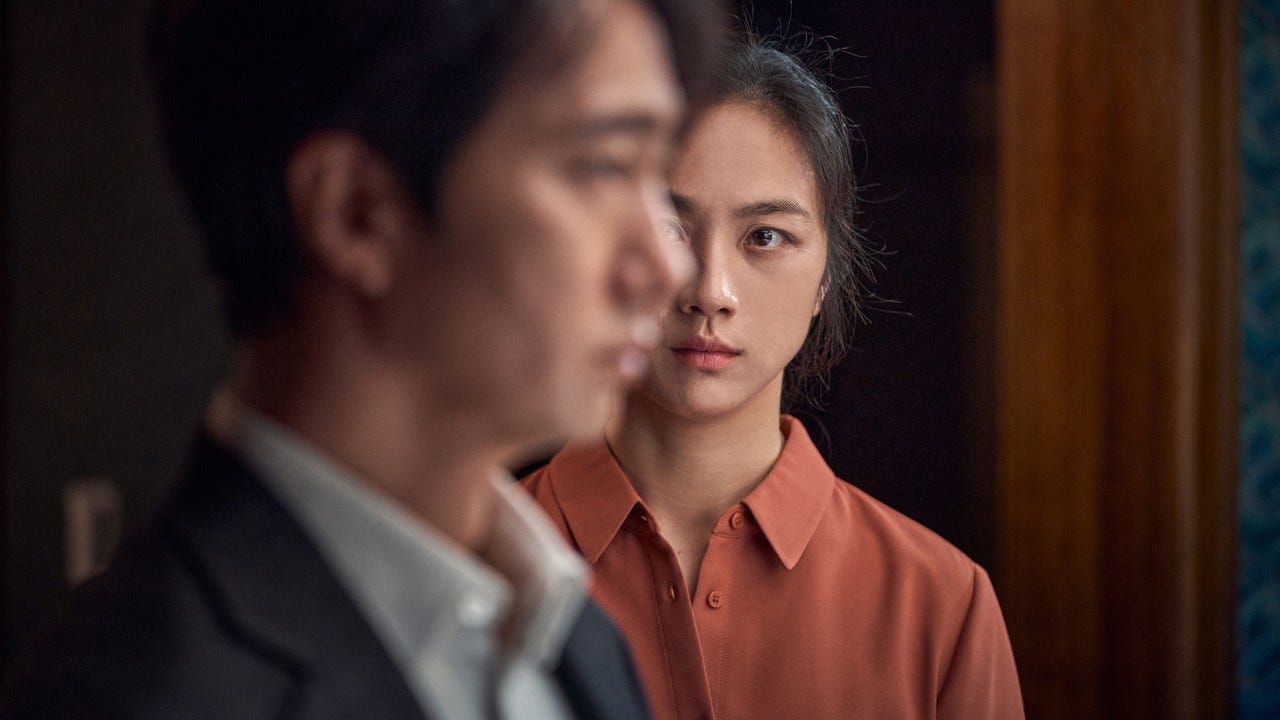First of all, I am sorry to report that while it gets the prime placement at the top of this newsletter, Avatar: The Way of Water is not among the ten best films of 2022. (As chosen by me, but I am sure you knew that part already.) Before I dive in, a) a couple thoughts on the year as a whole and then b) some brief opinions on a handful of films that are not in the top 10, for one reason or another.
I am not a particular fan of the notion that a given year in film is a bad one, or is lacking in quality. There were some truly excellent films in the year of our Lord 2022, just as there were in 2021 and just as there will be in 2023. What I do think is notable, and troubling, is how few standout films there were among studio-released fare. Of course, part of the problem is that much of what the studios release is high-budget dross (as is always the case). But a fascinating aspect of this year’s slate of films is how often it felt like studios were ceding the box office to just a handful of movies (including the aforementioned Avatar).
Did you hear that Black Panther: Wakanda Forever held the top spot for five weeks in a row? Is it because the film is widely beloved? (I don’t think it is, although I know some folks did enjoy it quite a lot.) Or is it because the competition between November 11 and December 16 was…essentially nil? I don’t get why the studios made these choices, and doubt it’s going to change vastly in the new year. Not great, Bob!
Now my big list is just ten films, but I saw plenty more than that. I wanted to write a few words on some films that are either close to being within my top 10, or had absolutely no chance but are big enough to be talked about.
Babylon: My favorite film of all time is Singin’ in the Rain. I am tempted to presume Damian Chazelle’s got it high on his personal list as well, which is wonderful, because it’s nice to enjoy things. I did not enjoy Babylon, a film that, like the fabled ourobouros, eats its own tail and gobbles up the audience with it. Parts of this movie are compelling or well-made or well-acted, but on the whole, I found this to be exhausting and obnoxious. (I find it almost as exhausting that people online are chiding an amorphous group of others for mocking this film’s failure at the box office. Is it a good sign for future original fare that Babylon did poorly? I suppose so, but in what world was a hard-R-rated, three-hour period piece going to be a smash hit? And in what world is a movie that’s such a shameless rip-off of Singin’ in the Rain and Boogie Nights deemed the height of originality?) I realize some people whose opinions I respect enjoy this, but no. This movie ain’t it.
The Whale: Two things, as they say, can be true. First, Brendan Fraser is an immensely charming actor whose career deserves all the second-wave plaudits. Second, this exceedingly stagy adaptation is gawky, saccharine, tiresome bullshit. If Brendan Fraser wins an Oscar for this (and he should not), it will be extremely depressing to realize that an industry that chews up and spits out stars only welcomes them back when they debase themselves in this way. I want the best for Brendan Fraser. I hope one day, the best arrives.
Marcel the Shell with Shoes On: If the previous paragraphs have not made it clear, I can be a real grump about some of this stuff. So while I will preface that I did not strongly dislike Marcel the Shell with Shoes On, I am — at best — very baffled that this movie is up for Best Animated Feature, as it incorporates a number of live actors. (I was not a fan of Apollo 10 1/2, for instance, but I do agree that it deserves to qualify at the Oscars for the category in question; it’s a fully rotoscoped film.) I also, for whatever reason, just could not get onto this very twee film’s wavelength. I’m a sucker for sappy stuff some of the time (I adore the Paddington films, and would not be able to strongly disagree if someone dubbed them twee or sappy), but this one just grated on me from the start. And it’s not animated enough, in my grouchy opinion, to count as animation!
Avatar: The Way of Water: Credit where it’s due to James Cameron, who is one of the few filmmakers where it is unquestionably clear that watching his newest is something you have to do in the biggest possible theater. I do not love Avatar: The Way of Water the way some folks online do — if I was ranking Cameron’s films as a whole, neither Avatar would be in my top four — but it is unquestionably a jaw-dropping thing to behold. Looks amazing! No words can properly describe how great this looks, if you watch it in 3D, and in Dolby Cinema, and in high-frame rate. (I’m not a big HFR proponent, and it’s not perfect here, but it’s much more impressive than I’ve ever seen before.) But the story is less impressive, the characters are not terribly distinctive, and those aspects do matter to me. Great visual experience, and I probably won’t watch it ever again. And yet, what a head-scratcher — it’s already made a billion dollars! What a shock considering…uh…all the competition in theaters right now. (All that said — this movie arguably does qualify as being animated enough for Best Animated Feature.)
Top Gun: Maverick: This, however, is a great visual experience I want to watch at least one more time. I am not a fan of the original Top Gun — it still mystifies me that the 1986 film is that big a deal to so many people, but it undeniably is. I only caught up with Maverick in theaters about a month or so after it opened, and even in a standard-issue theater, it’s pretty goddamn remarkable to watch. Again, much of the story only works as trafficking in nostalgia, but some of it works very well. (The scene in which Tom Cruise and Val Kilmer reunite clearly transcends the characters they’re playing, for personal reasons, and it’s genuinely fascinating to watch Cruise emote so nakedly.) Maverick came close to being in my top 10, if only because of the action sequences. Tom Cruise is many things, but one of them is a terrifyingly committed stunt performer, and…yeah, listen, I’m not made of stone. The setpieces where actors are very clearly inside of fighter jets, zooming around, are very impressive because of the flip side of The Way of Water, where we all know it’s fake but looks real. Here, it’s real and looks it. I wonder if it’ll hold up on my 4K TV.
Pinocchio (Del Toro): Two different distinctive auteurs made riffs on Pinocchio this year. One of those films, from director Robert Zemeckis, is the worst I saw in 2022. (I am sure there were worse films. But I didn’t see those, thankfully.) The other, from Guillermo Del Toro, is appropriately dark and thorny and complex and haunting. It came close to cracking my top 10 as well, but the one thing that holds it back for me is something that the Zemeckis film also failed at: the songs are, uh, Not Great, Bob. (They are here forgettable, but when you’re up against one of the most iconic songs of all time from the 1940 film, you have a tough challenge ahead no matter what.)
Now, let’s get on with it and count down the best films of the year.
Armageddon Time: The discourse surrounding James Gray’s latest film has been fascinating to watch unfold, in large part because of how much its most passionate detractors seem to be misreading it. I could say that the possibility exists that I’m misreading the film and why it resonated so much with me. But the comparisons to Green Book — a truly awful film that won Best Picture in what is arguably the most embarrassing Oscar victory in years — are wildly off-base. This is a film steeped heavily in guilt and self-loathing, in which writer/director James Gray depicts a slightly hazy vision of his own childhood tinged with the gut-wrenching pain of self-aware white privilege. I can somewhat understand the criticisms surrounding Johnny (Jaylin Webb) and how the character’s given less detail than Paul (Banks Repeta), but I don’t agree with those criticisms, because it’s very much by design. All I can say is, I found this to be very powerful and to be almost choked with self-hatred from Gray’s part. Anyone who doesn’t think he’s being self-critical here is being more charitable to James Gray than James Gray is to himself.
Turning Red: One of the various stupid decisions that Bob Chapek made during his tenure as the CEO of the Walt Disney Company was to send movies like Luca and Turning Red to Disney+, while sending Lightyear right to theaters. It is awfully weird to have lived through two different Disney CEOs who seem to have a hateful hard-on for Pixar. (Chapek never got to last long enough to more publicly diss Pixar, as Michael Eisner did with Finding Nemo before it was released, but he sure did seem to hate the Emeryville-based studio.) As was the case with Luca, Turning Red is a shrewd, beautifully animated, tender, and heartfelt story that speaks volumes about its creator and their personal connection to the material. Domee Shi impressed me, and so many others, with her short Bao. But Turning Red manages to take a very silly premise and inject it with intelligence, wry humor, and a solid mother-daughter relationship.
Tár: This is one of two films on the top ten that I could easily see shifting upwards over time. Like Todd Field’s other films, Tár is a haunting, singular story. I don’t doubt Blanchett is a favorite for the Best Actress Oscar because she’s on screen for basically every second of this story, but the film as a whole is extraordinarily effective at establishing place and sticking to a recognizable plane of reality. (All the jokes, or non-jokes, people made about not realizing Lydia Tár was a fictional character speaks to how realistic this thing feels.) I do think there’s something kooky going on in the back half of the movie, though perhaps not to the extent that Dan Kois of Slate does. (I do agree with one point of his, regarding the non-reaction of one of Tár’s musicians when she appears backstage after some personal problems, and how that lack of a reaction seems too inexplicable to be an accident.) Anyway. I look forward to revisiting this in the years to come. It’s got layers.
The Fabelmans: When is it, do you think, that people chose to dismiss anything Steven Spielberg makes that isn’t something like Jaws or Jurassic Park? It’s a shame, because he made last year’s best film and The Fabelmans is pretty close to this year’s best. The reductive description is that this is Spielberg telling the story of how he grew up as a passionate cinephile who would be his generation’s finest director. But The Fabelmans is a much more complex and thorny affair, with solid performances throughout the ensemble, than its worst takes have presumed. (My favorite is that some people think Spielberg miscast Paul Dano and Michelle Williams as his parents, and…y’know, call me crazy, but I think he probably has a good read on which actors best embody his parents.) Anyway, just as some people took too long to realize that his West Side Story was excellent, I expect some folks will arrive late to the party on this one. Better late than never, I suppose.
Everything Everywhere All At Once: If you’re patient enough to not scroll down to see what titles come next, you’ll see a film that kind of switched order with this one. I caught up with Everything Everywhere All At Once later than most did, so I had a general sense of what to expect before clicking Play. In general, I was very impressed with this film even as it teetered on being a little too much, a little too exhausting in its depiction of a familial core being pushed to the breaking point. (Reading afterwards that one of the directors learned he has ADHD in the making of this film, and that such knowledge informed the initial character arc for Michelle Yeoh makes this a much richer text.) Yeoh’s performance is excellent, and I very much like Ke Huy Quan as well. It’s a solid film overall. Maybe I’m glad I saw it before some folks got super-mad online that some film critics disagree.
Decision to Leave: There is something to be said for watching a movie made by someone who knows how to make a goddamn movie. Park Chan-Wook is a master-class filmmaker already, as films like The Handmaiden and Oldboy have proven. Decision to Leave, aside from being a sly homage to the work of Alfred Hitchcock, just looks so great. And I don’t mean the set design or costuming (though they’re both quite solid), as much as the expert cinematography and editing, two aspects that can be easy to ignore or overlook until you’re face to face with a director who knows how to employ those tools with his collaborators so much. Decision to Leave has a great and suitably nasty story (perhaps not as much as Oldboy, but man, the end of this thing is just…chef’s kiss), and is polished beyond belief. Too few films are.
Nope: I prepped myself for Nope back in July by watching Get Out and Us back-to-back the same day I saw Jordan Peele’s latest in IMAX. Though Get Out is arguably his cleanest, tightest narrative, Nope is a close second for me in terms of Peele’s ability to craft a story of epic proportions. (I enjoy Us very much and think Lupita Nyong’o should’ve won an Oscar for her dual role, but the third-act reveals kind of unravel the whole thing for me.) Nope doesn’t go deep on the backstory of the strange alien hovering over a Southern California gulch, but it doesn’t need to. Peele deftly balances comedy and horror, often in the same scene, and builds such strong material that Daniel Kaluuya, Keke Palmer, and Steven Yeun each get to work wonders. (Yeun should be getting a Supporting Actor nomination for his monologue regarding a certain SNL sketch.) I can’t wait to see what Peele comes up with next.
The Banshees of Inisherin: Here is a film that has grown on me. I was duly impressed with it initially, but the more I think about it and its core broken relationship, the more I like it. (My snap-judgment placement of this, right after watching it, would’ve been in the back-half of my top 10, at best.) Colin Farrell has, especially over the last few years, proven himself to be one of the most capable and nuanced actors of his generation, but he’s well-matched in The Banshees of Inisherin by Brendan Gleeson, Barry Keoghan, and Kerry Condon. Martin McDonagh’s writing style is always inching towards some kind of dark whimsy, but the pained performances of the main quartet ground the story of how two longtime friends become enemies because one of them simply can’t understand why the other doesn’t like him anymore. It’s an excellent, heartbreaking, searing story.
Glass Onion: Some directors are just on your wavelength. Every line, every shot, every creative choice just seems to hit exactly the way you, as the audience member, want and need them to hit. One of the great memories I have of recent moviegoing came five years ago, when I sat in a press screening for Star Wars: The Last Jedi and genuinely gasped aloud at the shot of a spaceship slicing through a Star Destroyer in absolute silence. I’d love someone to write about what it is that Rian Johnson possesses as a filmmaker that inspires such…uh…passion among people. (While I am one of his biggest proponents, I am all too aware that lots of people don’t like his work.) Just as The Last Jedi proved divisive, Glass Onion has (in much more surprising ways) proven similarly so. All I can tell you is that I attended an early screening for this film, and laughed my head off. I would argue this is a sliver better than Knives Out, just a bit more propulsively paced, a bit funnier, and a fair bit sharper in its social commentary. I want Daniel Craig to make a million of these movies. I want one every year. (And in theaters, please.) I don’t care that other people don’t like this. I’m glad Rian Johnson gets to make these movies.
RRR: Some movies, you cannot forget watching. Almost ten years ago, as part of my coverage of the 2013 Fantastic Fest in Austin, I watched my first SS Rajamouli film, Eega, about a man who is transformed into a fly. I did so on my computer (via digital advance screener) in a spare bedroom, and found it ridiculous and delightful and weird and unique. Cut to early June of 2022, when I and the rest of my family came down with COVID (first and only time so far, knock on wood). I had gotten the virus first, and so was in the same spare bedroom during the work day with just my laptop to keep me company. And after work one day, I figured I would fire up Netflix to watch this new SS Rajamouli film RRR that I’d been hearing about on Twitter.
The rest, as the say, is history. RRR is one of the most captivating, singular films I’ve ever seen. If you want to make a connective argument about many of this year’s most notable titles, it’s that this is the year of movies going as hard as possible, being as extra as possible. RRR is a three-hour epic that feels as epic as humanly possible. I am not the first critic to note that the big action sequence here where one Indian man leads a miniature revolution upon his British oppressors by unleashing a series of wild animals upon them is massive and climactic…and it occurs halfway through. RRR — which I’ve seen twice and loved both times — is a film of political bombast so intense that it exceeds the bounds of sanity, a film so sincere and remarkable that it cannot be ignored. RRR is the best of the year. Go see it.






